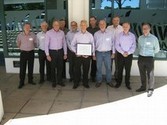From the Chair
At the NZUAG AGM recently, I noted that the year had been a particularly busy one for the NZUAG Board. We had focused on two key areas: finalising the Code review process in preparation for Ministerial approval, and planning and delivering the Code promotion and awareness seminars around the country. In addition, the Board successfully completed the Constitutional review, progressed the compliance and enforcement work and began making changes to the website. We communicated regularly with members through the quarterly newsletters and we have managed the finances prudently. All in all, a pretty good year.
We want to build on this year’s work so that we are in a better position to deliver improved services for members in the coming year.
On behalf of the NZUAG Board, I want to wish you and your family a safe and relaxing Christmas and New Year, and we look forward to being of service in 2017.
Regards,
Paul Swain
Chair, NZUAG
New Board Members Welcomed
The Board will have two new faces around the table as a result of the AGM. The first is Al Christ from Auckland Transport, who will be replacing Barry Williams as one of the LGNZ Board appointees, representing major TLA’s. The second is Tony Hale from Waipa District Council, who is the Water NZ appointee representing the Waters Utility sector. An opportunity to find out more about these new and other Board members will be provided in future newsletters.
Barry Williams Farewell
It was with a degree of sadness that the Board farewelled Barry Williams at the November Board meeting, due to his imminent departure from
Auckland Transport for a more relaxed retirement lifestyle. In recognition of Barry’s contribution to the work of NZUAG and his involvement in developing both the original 2011 National Code of Practice and its review in 2014, he was presented with a Distinguished Service Award certificate. In accepting the award, which was presented by fellow long-term Board member Ross Malcolm, Barry commented that “prior to becoming an active committee member of the NZUAG in 2005, I was fortunate enough to have a reasonable amount of involvement with the Auckland Utility Operators Group and my counterparts from the other RCA’s in the Auckland region. This was before the 2010 amalgamation and arguably our greatest achievement was the development of the Auckland Region Code of Practice for Working in the Road, a highly collaborative document that set consistency in the standards for anyone carrying out any activity in the road and the provider of some of the content to National Code.
The same spirit of cooperation, collaboration and professionalism is very evident, alive and well around the board table of NZUAG. The
representatives from all sectors have equal opportunities to air their views, many of which lead to healthy debate but never argument. Understanding each other’s needs and finding acceptable solutions must be the ultimate goal for everyone.

I will remember my time on the NZUAG, my fellow board members and our very able chairman with pleasure and fondness. I wish them and all of the members my very best for continuing good fortune and even though I am moving into the easier (hopefully) life of retirement I will watch the Society’s developments with interest.”
Barry receiving his Certificate from Board member Ross Malcolm
Working Groups
The Board Working Groups reported on their activities at the recent November 23 Board meeting, with steady progress being made in their respective areas. Now that the Code Education and Awareness Seminar series having been successfully run, the focus will shift slightly onto Code Compliance and Enforcement issues, particularly taking on board the insights derived from the seminar series. A further focus in this area will be improving KPI reporting and analysis. Work will also continue into upgrading and refreshing the website, as the NZUAG’s public face.
- Code Promotion and Awareness Seminars: Following on from the successful 2016 seminar series, the Board agreed to run these on a biennial basis, with the 2018 round to act as a Code refresher and introduction to the next formal review, while the 2020 series could focus on any changes to the Code arising out of the review process. It should be noted that the Code itself requires a review to be commenced within 2 years of a revised version of the Code being signed off by Ministers, which means the next review will be due to commence early 2018.
- Code Compliance and Enforcement: This team has been focusing on a couple of projects. One involves investigating the different ways Corridor Managers issue CARS. What is apparent is that a variety of approaches utilising a range of separate CAR management systems are being followed. This raised the question of whether a common Meta data standard might be useful. This was a topic touched on by LINZ in their presentation to the Board, which is reported on below.
The second project involves the collection of KPI information, which is a mandated requirement of the Code, and is integral to the original rational for the Codes development. It is apparent from the results collected to date (see separate item below) that further work is required to refine the questions being asked, including information necessary to allow meaningful and helpful analysis to take place. Further development of the KPI reporting methodology will form a key component of the teams work for 2017.
- Website Update: Work continues on updating and refreshing the website, with the intention being to keep the site more responsive to what is happening within the industry and ensure it is as easy to navigate and find key documents and information as possible. In addition the working group is investigating options to incorporate new technologies such as live-streaming into the site, which would allow webinars and on-line participation in future training and education series to take place. This will be reported on in future newsletters as progress is made.
- NZUAG Finances: The Advisory Group’s finances remain in a healthy position with a surplus of $14,846 for the year. While this is down on the 2015 result, this reflects the investment made into the successful Code Education Seminar Series held earlier in the year. An important outcome of the AGM was the decision to hold membership fees at their current rates for another year. This helps ensure membership remains a value for money proposition, and will hopefully lead to additional industry members deciding to become participants in the Advisory Groups activities. The details of the NZUAG financial report to the AGM can be found on the website.
RIMS Forum March 2017
Planning continues to take place for the 2017 RIMS conference, to be held over Wednesday 22 and Thursday 23 March at the Waipuna Conference Centre in Auckland. With NZUAG having taken responsibility for organising day two of this event it has become a core part of our activities, and so all members are encouraged to consider attending.
This 2nd day will consist of two concurrent streams that will focus on:
– Roading Optimised Decision Making and – Corridor Access Management
Along with detailed technical talks there will be workshops for sharing difficulties and learning’s, debating and digging further in to some key issues in these parts of the industry. These will include an NZUAG presentation Road Testing the Code. An important goal of the day is to provide a forum for professionals in the sectors of the industry that do not often get the opportunity to meet as a community to come together and make contacts/network.
Further details on the Forum are available from the forum website www.rims.org.nz, or by contacting Brett North (email brett.north@wcc.govt.nz), our NZUAG rep on the Forum planning committee.
LINZ Presentation
Angus Barg from LINZ updated the Board on work being done on two separate, but related projects currently being worked on. The first is a system called ‘My Worksite’ which will be similar to CAR Manager, but with extended functionality, which is due for release in the New Year. The second is a product called ‘Forward Works Viewer’ which will help answer the question ‘what is happening on a given network right now?’, as well as identifying opportunities for greater coordination between utility operators and offering linkages into the NZTA National Emergency Management System (NEMS) which would be helpful in disaster recover situations. The impetus for both developments flows from work done by LINZ with Christchurch City Council and SCIRT around post Canterbury earthquake construction coordination.
Auckland Transport are about to go live with a pilot project using both systems, while Wellington City Council is embarking on its own evaluation project. Both systems are designed from a principle of full data transparency, resulting in them being built on open software platforms and data standards. The Board discussed the role that it could have in helping establish a single set of Meta data standards, which any solutions within the market place could then work to. Further discussion on this topic is expected to take place at the next Board meeting in February 2017.
KPI’s Reporting
A report offering an initial, indicative analysis of results received to date was discussed by the Board. This identified a number of issues with the data that had been collected, including a lack of consistency, especially with regard to Utility Strike data, along with the fact that not all reporting entities had sent in their returns, meaning that any comparisons were incomplete. The situation was exacerbated by the fact that only 1 year’s results are available, with any real value to come from analysis of changing trends over time.
What this highlighted was the need for further thinking around the key questions that required answering, in order that data specificity could be tightened up and additional secondary data could also be collected to allow meaningful comparative results to be produced. As noted above, the refining of data collection requirements will become a major focus for the Board over the 6 months, leading to a more comprehensive reporting and analysis to be provided following the receipt of 2016-17 KPI data.
Electric Vehicles – the way of the future
One area that has received much media attention in recent times is the advent of electric vehicles as an alternative to the current internal combustion engine powered vehicle fleet. Of particular interest to NZUAG is how the provision of public charging infrastructure is handled. NZTA are key players in this debate, and so Ian Cox started off the Board discussion on this topic. It was generally agreed that the legal situation around methodologies for making requests and getting approvals is lacking in clarity in current legislation. This could cause conflicts down the track and the best outcome would be for parties to discuss this up front and resolve how they will deal with it together by co-operative process. This is very likely to impact on long-term relationships if it is not sorted. The Board resolved to consider further action should such a disruption occur but in the meantime will see if there is any other avenue that can be taken to improve the situation.
